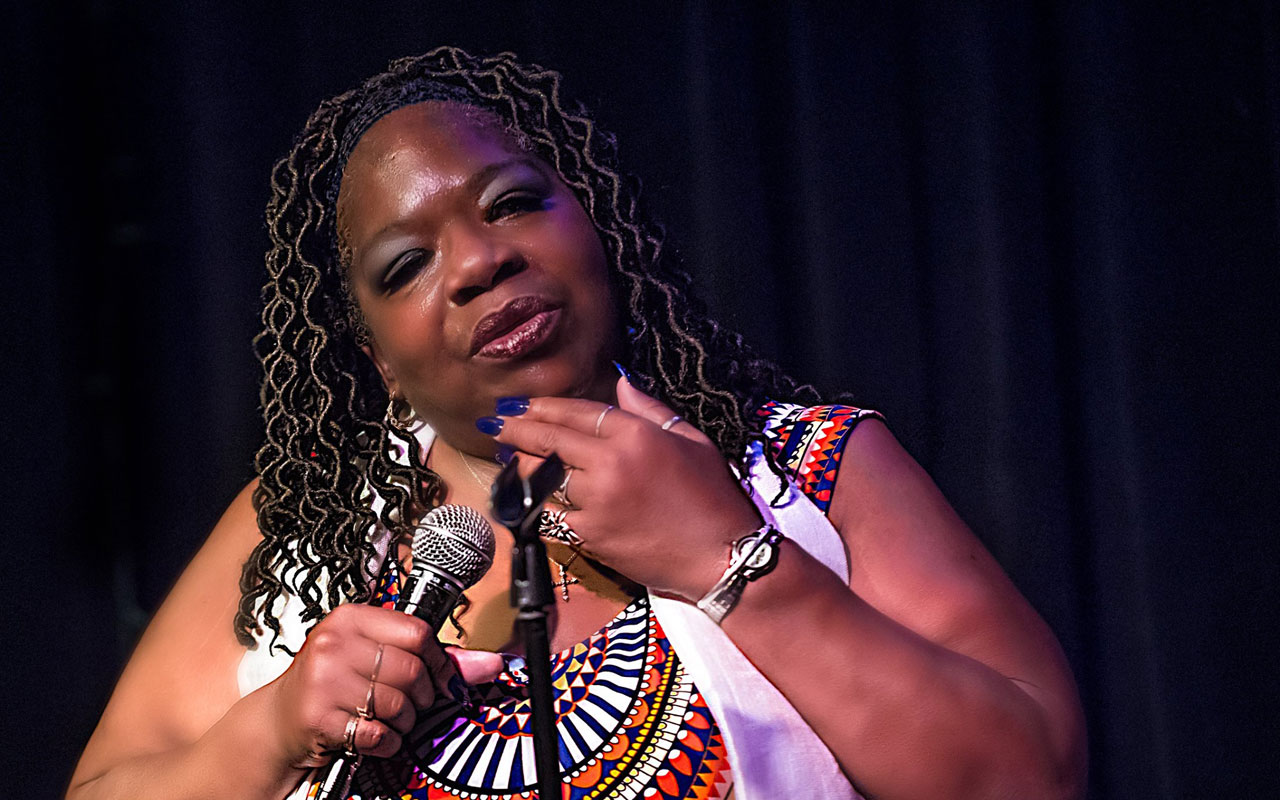
Elnah Jordan photo by Steve Parent.
BY PAUL RAUCH
The Royal Room has always been a hybrid of sorts; transforming itself from a nightclub to a project room in the blink of an eye. It could resemble a dance hall one evening and a traditional jazz club the next. That creative vision for the room has always included a broad spectrum of musical genres represented onstage since it’s opening in 2011. Such was the precept that accompanied pianist, composer, and Royal Room club owner Wayne Horvitz into his partnership with well established Seattle bar, restaurant, and venue owners, Tia Matthies and Steve Freeborn.
In 2016, they launched the South Hudson Music Project, a 501(c)(3) non-profit, to create a new path of sustainability for music presentation at the club. This model allows for projects to be less dependent on ticket receipts, and instead on building a more reliable pay structure for artists.
“All along, having a non-profit and trying to raise money separately through donations is not just to make the whole idea of a club self-sustainable, but to eventually pay musicians better,” says Horvitz.
Over the course of the COVID-19 shutdown, The Royal Room has had to shapeshift even more to survive the financial onslaught the worldwide pandemic brought to the music business in March of 2020.
“Our first concern was our staff,” recalls Horvitz, reciting a common concern of the gig economy in general. A GoFundMe page was created to help those employees not eligible for unemployment benefits. The Royal Room’s landlord, the Royal Esquire Club, provided avenues of support to see them through the shutdown. “The Royal Esquires were really generous in terms of rent abatement,” says Horvitz.
With the club eyeing a reopening date of September 15, various renovations are in the process of getting done, right down to re-stringing the prized Steinway grand piano that waits patiently atop the iconic starlit stage. In hopes that the most difficult times are behind us, Horvitz is keenly aware of the value the venue provides the creative music community in Seattle. The pandemic, and the eighteen-month shutdown that has so far accompanied it, perhaps validates that premise. “In a lot of ways it reinforced the value of the Royal Room. It is a place where we do really look for great art, but also a place where the community can play,” states Horvitz.
The first week of programming for the reopening is emblematic of the Royal Room we have all come to know, featuring such area stalwarts as McTuff, Thadeus Turner’s Thaddillac, Elnah Jordan, and a free Friday night dance. Appropriately, opening night will feature the club’s well received Piano Starts Here series, with a cadre of Seattle pianists channeling the music of Duke Ellington, Carla Bley, Teddy Wilson, Cole Porter, and Horvitz himself.Also featured are Ann Reynolds, Jose Gonzalez, Darrius Willrich, and Alex Guilbert, the event’s host.
Monday nights will find two jam sessions bookending the weekly performance of The Royal Room Collective Music Ensemble (RRCME). Saxophonist Stuart MacDonald will host a late afternoon jam session for younger players, featuring musicians from the area’s celebrated school music programs. Trumpeter Thomas Marriott will follow RRCME in the evening with an open jam session that will begin with a short set from host musicians. Horvitz is considering closing on Tuesday nights.
With the uncertainty brought on by the pandemic, the subsequent loss of venues such as Tula’s, and a sizable portion of Seattle’s jazz audience still reluctant to venture out, The Royal Room may be more important than ever. It provides a quality performance space for resident artists with an excellent backline. While Marriott’s Seattle Jazz Fellowship slowly takes form, and increased opportunities for local artists from Earshot Jazz and Jazz Alley rise in support of Seattle’s traditionally vibrant jazz scene, the Columbia City nightspot stands firm in its commitment to creating a space that will be increasingly beneficial to Seattle musicians and the patrons that find their work essential. With Downtown Seattle in a state of serious transition, it stands to reason more music fans will look to neighborhood venues to provide the music they have sorely missed this past year and a half, including Columbia City. The Royal Room may yet see its best days ahead.